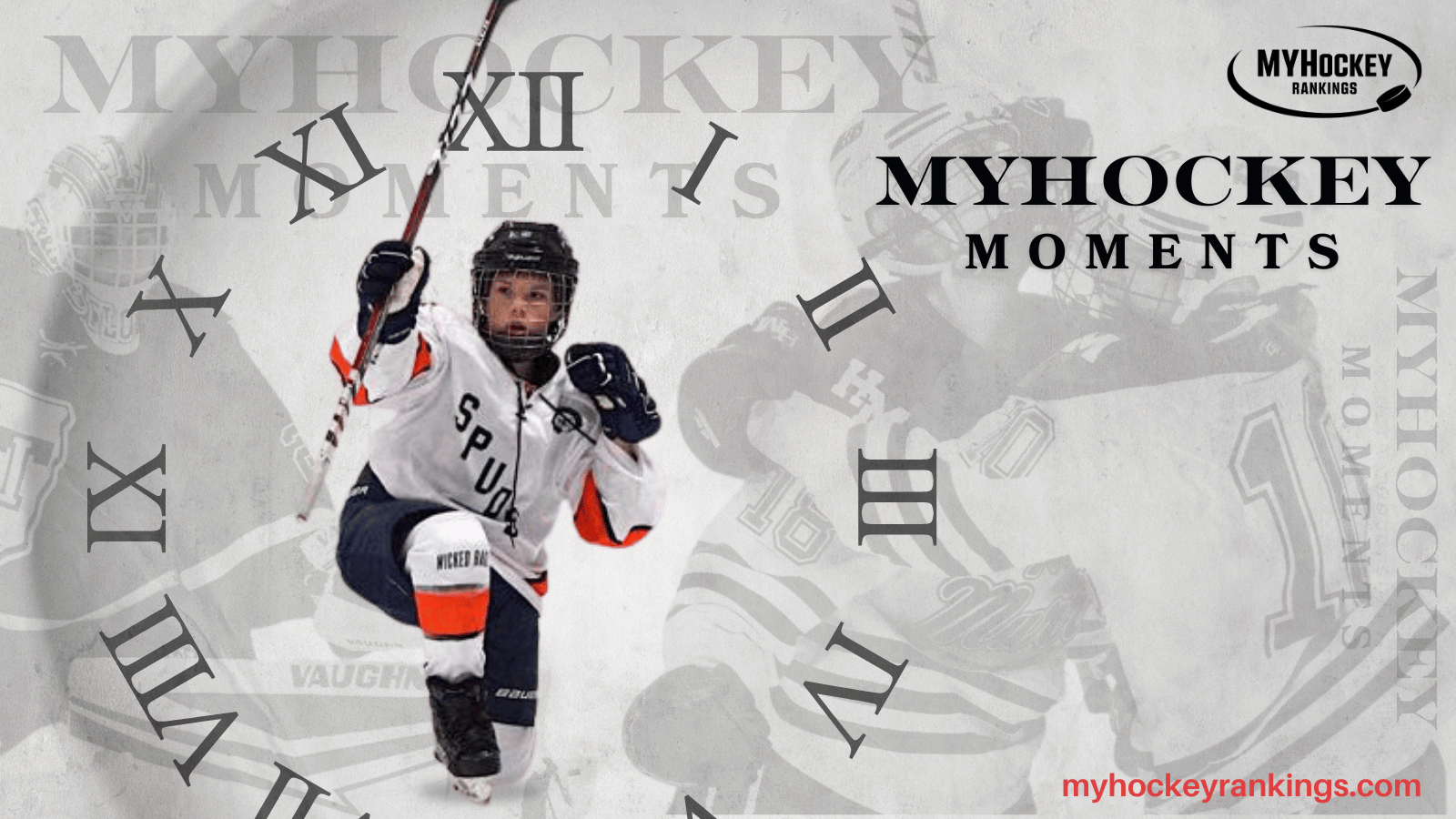
MYHockey Moments: Parents, These Three Words Can Make a Lifetime Impression
MYHockey Moments is a series of articles drawing from the author’s experiences working at all levels of sports. The series is intended to provide insight, reflection and teachable moments for coaches, young hockey players and their families. His experience is listed at the end of the article.
By Scott Lowe - MYHockeyRankings.com
As we get older, many things are true.
While most of us have at least a core group of friends from our youth or high school that we keep in touch with, it seems as though every passing day further separates from most of the people we spent time with during our younger years.
We’re trained to grow up, leave home for college and pursue the best job we can find. Professional ambition carries us to far-off places in search of financial and emotional happiness, which of course exposes us to many new colleagues, cohorts, friends and associates.
Family life leads us down another path as we focus on providing opportunities and activities for our children, which in turn exposes us to more families who we share common interests and activities. The parent lifestyle brings with it a bit of chaos, a lot of running around and less time to stay in touch with people from our past.
As our free time dwindles and our children become the focus of our daily lives, we prioritize the ways we spend our free time. While some people are better at managing their time and find ways to keep in touch with their friends and colleagues from the past, each step removes many of us from our youth a little bit more.
This certainly has happened to me personally, and at times losing touch with so many of the people I spent so much time with as a kid makes me sad. Maybe the reality of getting older is what causes that feeling.
Another phenomenon of growing older is losing people who impacted our lives.
All of us reach a point where people who meant a lot to us – parents, relatives, parents of friends, role models, teachers, athletes we admired, musicians we listened to and actors we welcomed into our regularly – begin to pass, leaving us feeling a little more empty inside each time while also sending our thoughts racing back to a simpler and more innocent time.
When this first starts happening, it tends to be folks we grew up idolizing or adults who played a role in shaping our lives.
I was fortunate to be able to spend a lot of time with three of my four grandparents as a kid before they passed. Both of my kids got to know two of them very well. That doesn’t happen often.
Not too long ago my high school baseball coach passed. He was a lovable, larger-than-life character who was a teacher in my hometown. Everyone knew him. Coach was one of my favorite people in the world, and unfortunately, I don’t think I ever got to tell him that. Not a week goes by that I don’t recite one of his favorite sayings as one of my kids stares at me blankly.
His passing, of course, sent me down an internet rabbit hole as I searched for online posts about his legacy and tried to find some of my teammates. While there are many things about the internet and social media that are frustrating and disturbing, at least today’s technology allows us to find people and reconnect.
Through Facebook, Coach was able to follow the athletic careers of my own kids, and social media also helped me link up with a former teammate who had a son the same age as mine. We ended up coaching our kids together for two years and were able to post a photo when we coached them in a game at our old high school field. Coach liked the post and responded.
Despite the negatives that come with it, the internet does make it easier to at least maintain some contact with our past, and that’s a very good thing.
I was smacked in the face with another reality while searching the internet after Coach’s passing. At some point as we age, the people who leave the world start to become contemporaries – or even worse – we start losing people who are younger than we are on a regular basis.
My search turned up several classmates who had passed away far too young, which was shocking and got me thinking about how short our time here is and how we should spend more time doing what we love and spending time with those who make us happiest.
It happened again yesterday when football great Nick Mangold passed away because of complications from a rare kidney disease. He was just 41 – quite a few years younger than me – and if doctors could had found a matching kidney donor for him, he might have made it. They didn’t.
I’m not a New York Jets fans, and generally where I’m from we pretty much detest anything sports-related from New York, but when I recalled seeing his recent social-media plea for a donor with a matching kidney, I was overwhelmed with grief. He was so young and was that close to being able to remain here with us.
Heart-wrenching.
While death can be excruciating and devastating, it also brings friends and families together to reminisce about the good times and honor the legacy being left behind. In some ways it can serve as a reminder to recalibrate our lives and treasure each day and relationship a little bit more.
It was not long ago that another contemporary passing before his time led me down another internet path with an unexpected positive outcome.
Not long ago, former college basketball star Lawrence Moten passed away. Moten only played three years in the NBA – so many readers may not know much about him – but his college career at Syracuse stacks up to anyone’s. He left as the program’s all-time leading scorer with more than 2,500 career points and was the only player in school history to record at least 500 points in each of his four seasons.
Moten was a few years younger than me, and I vividly remember watching him play in college. He was the rare elite athlete with the ability to slow the game to the pace he preferred when the ball was in his hands. He was unguardable and clutch. He always had the ball when it mattered most, and he almost always found a way to get to the basket.
Moten grew up very close to my hometown in Washington, D.C., and he attended Archbishop Carroll High School, a local basketball power at the time, before committing to Syracuse. His passing got me thinking again, and I remembered that a kid I played basketball with on a local town team had played with him in high school.
So, I searched online for my teammate, and what I found an uplifting message that I wanted to share here.
While searching, I stumbled across a published version of the eulogy my teammate had spoken in his father’s memory. I knew his dad – everyone knew his dad, a giant and friendly man who was very active as a coach and commissioner in our local boys and girls club – and the news of his passing brought back more childhood memories. Not only did we play on the same team, but my teammate and I shared many of the same friends and walked in similar circles even as he went off to attend a different high school.
The eulogy was beautiful and moving, painting the picture of a dedicated family man who had given so much to his kids and so many others without making a dime doing it. One section of the eulogy really struck a nerve, and can serve as a great lesson for parents of any young athlete.
The passage speaks for itself:
“I remember after my high school basketball games, seeing my dad in his long, khaki winter trench coat waiting next to my sister … He would say the same three words to me after every game, win or lose, ‘You played well.’
They were words that were affirming after victory and consoling after defeat, but sometimes after a bad game, I would retort sharply, "What game were you watching Dad?" But I still wanted to hear those words.
My dad already knew there were enough videotape and coaching points to highlight his son's every flaw and imperfection. That was somebody else's job. He knew his was to simply tell me, ‘You played well.’ That simple kindness was my reset button. His quiet patience. His simple kindness.”
I have worked at various levels of sports for more than 30 years, but my coaching career began even before I had graduated from college and lasted for more than 25 of those years. I was best at baseball, and that’s what I know the most about. Hockey was the sport I loved and wished I had pursued longer. I also played tennis, soccer and basketball. I have coached each of those sports except tennis and was a reasonably successful high school baseball head coach for a few years.
Of course, like many dads with an athletic background, I coached many – but not all – of my son's teams. When it came to baseball, I was confident that I could provide better coaching and a better experience than most others, but that was not the case in hockey.
By the time he was 14, my son’s ability on the ice – and the level at which he needed to play – far exceeded my knowledge and coaching ability. It was time for him to move up to a higher level and for me to become the supportive dad watching from the bleachers.
As a coach, I was very hard on my son. Many times, I was too hard on him. It was intentional. I knew he could take it and that most times he would understand, but in my mind it also sent a message to the others that I wasn’t favoring him, that no one was beyond criticism and that everyone would be held accountable.
Those justifications don’t always make me happy when I think about my approach, but I believe strongly that the treatment helped him later in his career when he had to deal with other coaches who challenged him and perhaps weren’t always fair.
Once he moved on to higher levels, though, perhaps subconsciously I stopped being critical and started being as supportive as possible. I’m not sure I even realized it except for a few situations that he pointed out to me without prompting.
As it became clear that my son was a legitimate college hockey prospect, he often would be approached by opposing coaches, scouts and even parents of his competitors after games. They would pay him a compliment or ask about his future plans, and he often would reply with, “Well my dad thinks I’m good enough to play in the NHL, but I just really want to try to play in college.”
I didn’t really think he was going to play in the NHL (maybe I did a little?), but that comment made me realize how much my approach with him had changed. Looking back, that makes me happy.
Another time we were leaving the rink after a game when he was 17. Often players who are really interested in pursuing hockey in our area reach a crossroads at that age. While some players are really committed to the sport and doing whatever it takes to advance to a higher level, many of their teammates realize that hockey is coming to an end for them, which often causes their commitment to wane.
That can be extremely frustrating for the serious players, and apparently their fathers, too.
That day, my son’s team had turned in a lackluster performance, barely beating a much weaker team. He had scored the game-winning overtime goal, which I should have been celebrating with him, but instead I mentioned my frustration about the commitment and play of his teammates.
He got visibly frustrated with me, and I asked him why he was mad at me for talking about the play of others. His response shaped my behavior for the rest of his hockey career.
“You’re being so negative,” he snapped, and I mentioned that I wasn’t being negative about him, “But you haven’t done this for a long time, so why are you doing it now?”
I could tell that he was as frustrated with his teammates as he was with me, but the message came through loud and clear. He knew exactly what was going on with his team and probably had just sat through the coach telling him and his teammates the exact same thing I was in the locker room.
Coaching was no longer my job; my job was to be the supportive parent.
At first, I was a little stunned by his comment, but as I thought about it I took it as more of a compliment. He appreciated that I had dropped the negativity and analysis and been more supportive since I stopped coaching him.
My son would go on to get drafted by a pair of Tier 2 junior teams and played five years of college hockey at the NCAA Division III level, but I never forgot that conversation.
Early in his junior career he went from being team captain and the best player on his 18U team to just another guy trying to earn a regular spot in the lineup. There were games he didn’t play. Sometimes when he did play it was only for a handful of shifts. Other games he was in the top six and played a much bigger role.
No matter what, though, my postgame speech was always the same: “You played well.”
In full transparency, sometimes I would say, “You played great,” but that was the extent of it. Usually he would nod sheepishly; I could always tell if he didn’t agree with my assessment but wouldn’t push the conversation any further. Other times when things were going well, he’d smile and be more upbeat and talkative. And every now and then he’d just start walking to get away from others and express some frustration.
That was rare, but I always let him guide the conversation without chiming in or providing my take. That wasn’t always easy, but I had learned my place.
We continued that postgame tradition all the way through college. Every game.
It probably wasn’t always true, but by that point it was an accurate account of his performance way more than it wasn’t, at least according to the supportive dad.
Those days have passed, and now he’s coaching kids who hope to follow in his footsteps. Thankfully, he’s much less emotional and more level-headed than I ever was, but he’s as competitive as anyone you’ll ever meet. That’s a combination that should serve him well if he decides that coaching is something he wants to pursue as a career.
While I sometimes wish that I had been more of the supportive dad and less of the emotional and critical coach when he was younger, it makes me happy to know that he was able to see a change in my behavior and can apply what he learned from my actions to be a better coach and person.
I miss those postgame “chats” with both of my kids; my daughter played college lacrosse and is finishing up graduate school now. Time really does fly. Trust me.
Kids grow up quickly and we keep getting older. Spend those fleeting moments together being as supportive as possible. That’s what they will remember most.
As my teammate said in his eulogy, “My dad already knew there were enough videotape and coaching points to highlight his son's every flaw and imperfection. That was somebody else's job. He knew his was to simply tell me, ‘You played well.’”
Scott Lowe currently runs a program called DMV Prospects in Maryland that advocates and provides exposure and college counseling for hockey players in that area who hope to play beyond youth and high school hockey.
He coached various sports, including hockey, at multiple levels for nearly 30 years and spent 15 years working in athletic departments at the NCAA Division I level. His daughter played lacrosse and was captain for a nationally ranked NCAA Division III program, and his son was a two-time captain who played more than 100 career NCAA Division III hockey games.

